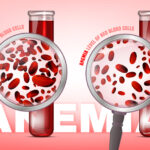Iron III -hydroxide polymaltose complex in iron deficiency anemia / review and meta-analysis
Iron(III)-hydroxide polymaltose complex (IPC) is an iron preparation with non-ionic iron and polymaltose in a stable complex. The usefulness of IPC in the treatment of iron deficiency anemia (IDA) has recently been a topic of much debate. By reviewing the published literature an overview is provided of the existing comparative evidence vs. ferrous sulfate as reference. For this purpose the standard methods and criteria as described by the Cochrane group are employed. The aim was to establish whether there are differences concerning efficacy (primary end-point: hemoglobin after approx. 2 months of treatment) and concerning safety (number of patients with adverse drug reactions [ADRs]). From an initial group of 14 comparative trials identified, 6 comparative studies (1 double blind) conducted in adults could be retained for analysis. Four pediatric studies initially selected had to be rejected because of heterogeneity of data at baseline. In adults (319 IPC, 238 ferrous sulfate) at the end of the study period (8-13 weeks) the mean hemoglobin values were 12.13 +/- 1.19 g/dl with IPC vs. 11.94 +/- 1.84 g/dl with ferrous sulfate (weighted mean difference WMD = 0.01 [95% CI -0.23, 0.21] g/dl). Not all studies reported on ferremia (higher with IPC), transferrin saturation (no difference) or ferritin (lower with IPC). Adverse drug reactions were reported less frequently with IPC (14.9%) than with ferrous sulfate (34.1%; p < 0.001), particularly upper digestive troubles, stained teeth and diarrhea. The meta-analysis of studies conducted in adult patients with iron deficiency anemia, comparing IPC with ferrous sulfate in equivalent doses, showed that the two compounds attained similar hemoglobin levels, thus suggesting similar efficacy. The tolerance of IPC in adults was clearly better than that of ferrous sulfate; the differences were also significant for the individual adverse reactions. This probably reflects a better risk/benefit ratio of IPC in adults. Properly conducted randomized controlled trials, particularly in pediatrics, are needed.




